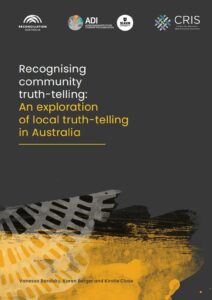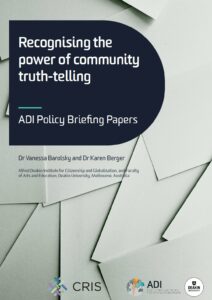Summary
The Recognising community truth-telling: An exploration of local truth-telling in Australia report is a unique collaborative study between Reconciliation Australia and Deakin University’s Alfred Deakin Institute for Citizenship and Globalisation.
Aboriginal and Torres Strait Islander people have long called for processes of truth-telling. Numerous community projects have emerged to reckon with our pre and post-colonisation historical truths, however few of these initiatives have been documented.
This report highlights the many different ways community truth-telling can be realised, and how these efforts contribute to reconciliation.
The study demonstrates through case studies:
- The immense perseverance of Aboriginal and Torres Strait Islander communities in undertaking truth-telling, often with limited resources and support.
- The significant impact community truth-telling has had in shifting the national narrative about Australia’s colonial history.
- That Aboriginal and Torres Strait Islander communities see truth-telling and acknowledgment of the past as crucial steps towards genuine reconciliation.
- However, there is much more work to be done to support community truth-telling in Australia.
The report’s corresponding Policy Briefing Paper, developed by Deakin University’s Alfred Deakin Institute for Citizenship and Globalisation, summarises key findings from the report and suggests ways in which truth-telling could be supported.





